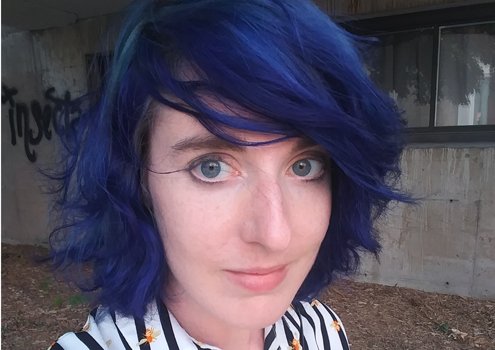Reading time: About 2 minutes
Madelaine Caritas Longman estimates that estimate that for most people, writing is at least 80% rewriting…
Madelaine Caritas Longman is the author of the poetry collection The Danger Model (McGill-Queen’s University Press, 2019), which received the Quebec Writers Federation Concordia University First Book Prize. Her writing has appeared in PRISM International, Vallum, Room, The Ex-Puritan, Grain, and elsewhere. In 2020, she was shortlisted for the PRISM International Creative Nonfiction Prize by Alexander Chee. She lives in Montréal.
I was excited to talk to Madelaine about how she approaches writing.
Q. Roughly how much time do you spend writing every day?
I make it a point to write every day, even if that’s only a 20-minute free-write or a walk in the park jotting notes in my phone. Typically, I write for three to four hours per day, plus another one to three hours of reading for research and inspiration.
Q. What’s a simple activity or habit that makes you a better writer?
I’m inspired by haiku poet Masaoka Shiki’s concept of sketching from life, which involves paying close attention to the surrounding world and describing its details as objectively as possible. This gets my mind working when I feel uninspired – there’s always something worth noticing when I look outward.
Q. What interferes with your writing?
Because the arts are undervalued, many people don’t respect a writer’s solitary writing time the same way they would someone else’s work hours. I’ve found it necessary to protect my time and set boundaries, even if not everyone always understands.
Q. How do you persuade yourself to sit down to write on days when you really, really DON’T feel like doing it?
I’ve found a loophole in that I don’t technically need to sit down to write – I can walk and take notes while brainstorming, or scribble a line here and there as I pace with my morning coffee. Once the thoughts get flowing, the motivation and focus tend to kick in.
Q. Is there a particular motto or saying that you’ve found helpful for writing?
Kelli Russell Agodon writes, “everyone wants to read the poem / we’re afraid to write.” When I’m embarrassed or hesitant to write about something that nonetheless feels important to me, sometimes that’s a sign to do it anyway. There can be valid reasons not to publish material, but I shouldn’t censor myself before I’ve even written it.
Q. Which stage of the writing process do you enjoy the most: researching, writing or editing/rewriting and why?
Once I’ve settled into a rhythm and voice, the writing stage becomes very exciting. I love the surprise of what comes out, and how the slow accrual of ideas and images suddenly begins to stream into something that feels cohesive and alive.
Q. What’s one of the best books you’ve read (either fiction or non) in the last five years?
Xanax Cowboy by Hannah Green is an incredible poetry collection. Moving, lucid, devastating, funny, and surprising. Brilliant.
Q. What book are you reading right now?
Bryan Washington’s short story collection Lot.
Q. What do you think is the biggest misperception that new writers have about the act of writing?
The amount of editing behind the scenes. I’d estimate that for most people, writing is at least 80% rewriting. A piece pouring out fully formed is exceptionally rare, so it’s okay not to always feel inspired or “on.” Working consistently will add up. Dedication is also a form of passion.


